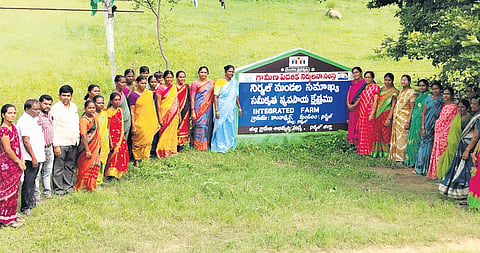

ADILABAD: While agriculture is a source of livelihood for several people in the Nirmal district, farmers often complain about the shifting weather patterns, deteriorating soil quality and poor harvests. In a bid to address this, the Nirmal Mandal Samaikya (NMS) has embraced the concept of integrated farming, which has helped transform one acre of land into a thriving ecosystem.
Since last year, this approach has not only yielded impressive results but also set an example for sustainable agriculture. By combining the cultivation of vetiver grass, organic leafy vegetables, fish farming and poultry, the NMS has created a model that balances economic gains with environmental conservation. With strong support from local authorities and a focus on sustainable practices, the group is reaping the rewards of their hard work.
Officials point out that a key component was the cultivation of vetiver grass on 10 guntas of land, which serves as a solution for soil erosion, water conservation and overall soil stability. Vetiver grass is particularly effective for erosion control due to its dense root system, which prevents runoff. Additionally, it is considered to be a natural air purifier and contributes to water conservation, they said, adding that after it was planted last year, the vetiver crops are now ready for harvest. Some of the vetiver plants will be used near soak pits, while others will be sold for profit.
Speaking to TNIE, District Rural Development Agency (DRDA) project officer P Vijayalaxmi mentions that NMS is already seeing good returns from integrated farming. The vetiver saplings were sourced from Bengaluru and have thrived under the care of the group. Water from the fish pond, which is regularly cleaned, is used to irrigate the vetiver, and the plants have grown to an impressive height of 7 to 8 feet.
The NMS plans to sell the vetiver grass and is expecting a revenue of around Rs 50,000, after deducting an initial investment of Rs 12,000. In addition to its environmental benefits, vetiver roots are used for medicinal purposes and in the creation of idols. The plants will also be used near water harvesting pits, contributing to efforts that have earned a Guinness World Record for the district. This practice is expected to further enhance groundwater levels.
Marketing efforts have already attracted interest from NGOs, and the group is optimistic about making a profit. The success of vetiver farming is not unique to Nirmal; it has been widely adopted in Tamil Nadu and even in some foreign countries. Inspired by these examples, the NMS integrated vetiver into their farming strategy.
District collector Abhilasha Abhinav has been actively encouraging integrated farming initiatives and supporting self-help groups in the area, contributing to the growing success of such sustainable practices.